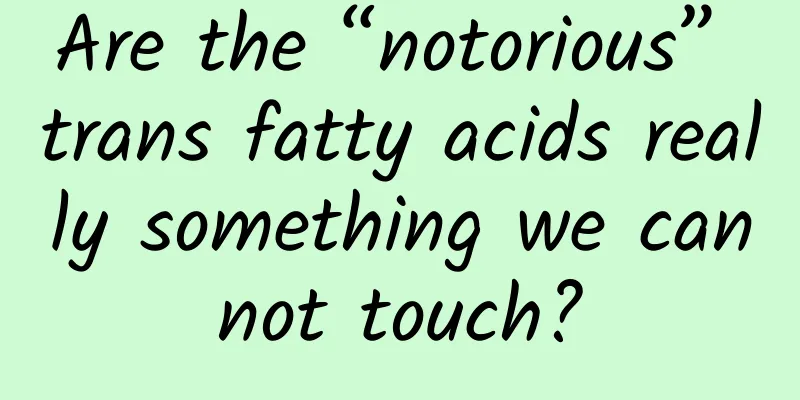Are the “notorious” trans fatty acids really something we cannot touch?

|
Ruan Guangfeng Cheese and cheese sticks have been very popular among parents in recent years. However, a few days ago, some media reported that "a well-known brand of dairy products contains trans fatty acids, which are harmful to health", and many netizens reminded parents to "be careful" and stop feeding their children with cheese. Is cheese really inedible? What are trans fatty acids? Fat is a triglyceride formed by fatty acids and glycerol. Fatty acids have different names depending on their structure. Trans fatty acids are a type of fatty acid and are unsaturated fatty acids. Existing research shows that the main harm of trans fatty acids is that they significantly increase the risk of cardiovascular disease, because they increase the level of low-density lipoprotein (LDL, the bad cholesterol) in the blood, while reducing the level of high-density lipoprotein (HDL, the good cholesterol), which can also lead to arteriosclerosis and the risk of heart attack. As for the claims that it will have other effects, such as obesity, cancer, diabetes, growth and development, reproductive health, Alzheimer's disease, etc., there is insufficient scientific evidence. There is also a saying that trans fatty acids will accumulate in the body and are difficult to metabolize (it takes 51 days to metabolize in the human body). This is not scientifically based. In the human body, trans fatty acids and ordinary fatty acids are metabolized in the same way, and no difference has been found in the metabolic pathways of trans fatty acids in infants, children, teenagers and adults. Which foods contain trans fatty acids? First of all, trans fatty acids are also found in many natural foods. They mainly come from ruminants, such as meat, fat, milk and dairy products of cattle and sheep. Moreover, human breast milk also contains trans fatty acids. Studies have found that the content of trans fatty acids in breast milk accounts for between 1% and 10% of the total fatty acid content in breast milk, such as 7.0±2.3% for American women and 7.19±3.03% for Canadian women. Secondly, hydrogenated vegetable oil also contains trans fatty acids. The hydrogenation of vegetable oil is an operation to improve the processing performance of food by adding hydrogen to unsaturated bonds to increase the melting point of the oil. Liquid vegetable oil does not have a good shortening effect, but after hydrogenation, it is semi-solid at room temperature and can meet the process and taste requirements. The use of hydrogenated vegetable oil can also improve the taste of food, such as making cookies more crispy and milk tea more lubricated. Its chemical properties are relatively stable, which can extend the shelf life, and it is cheaper than animal fats (such as natural butter). Therefore, hydrogenated oil is widely used in the food industry. However, when vegetable oils are not fully hydrogenated, some of their double bonds are converted from the natural "cis structure" to the "trans structure", making the fats containing them "trans fats". In addition, if the oil temperature is too high or the time is too long during frying, stir-frying, cooking, or deep-frying, a small amount of trans fatty acids will be produced. Do all hydrogenated oils contain trans fatty acids? In the incident mentioned at the beginning of the article, the media said that the cheese's ingredient list included "edible oil products", which means it was hydrogenated, that is, trans fatty acids. Do all hydrogenated oils contain trans fatty acids? In fact, only incompletely hydrogenated oils and fats will produce trans fatty acids. With the development and innovation of food science and technology, trans fatty acids in edible oil products such as hydrogenated vegetable oils can be well controlled. In order to eradicate trans fatty acids in hydrogenated oil products, non-hydrogenated (ester exchange) processes can also be used to make oil substitutes. Therefore, many hydrogenated vegetable oil products, non-dairy creamers, and cocoa butter substitutes can now achieve "0 trans fatty acids". Are trans fatty acids really inedible? Whether trans fatty acids are harmful to human health depends on how much you consume. At present, the dietary guidelines of the World Health Organization (WHO), including China, the United States and other countries, all recommend that the energy supply ratio of trans fatty acids should be less than 1%, which is equivalent to eating 2.2 grams of trans fatty acids for an adult who needs to consume 8,400 kilojoules of energy per day. However, survey data in my country show that the average daily trans fatty acid intake is 0.39 grams, which is equivalent to an energy supply ratio (i.e., the energy provided by trans fats as a proportion of the total daily energy of the human body) of 0.16%, which is far lower than the WHO's recommended value. Therefore, as long as you do not consume a large amount of foods containing trans fatty acids, the health risk is very low. For example, trans fatty acids are naturally present in milk, but the content is usually very low. On a 100-gram basis, the average trans fatty acid content in liquid milk is 0.08 grams, in milk powder 0.26 grams, and in yogurt 0.07 grams. In other words, a person would have to drink 2.75 kilograms of milk a day to exceed the WHO's recommended value. For Chinese residents, whose per capita dairy product intake is less than 50 grams, there is obviously no need to worry about excessive trans fatty acids. How to control trans fatty acids in diet Surveys show that (refined) vegetable oils are the main source of trans fatty acids that people consume. To control trans fatty acid intake, the following two points must be achieved. First, control the amount of vegetable oil used in cooking. The Chinese Dietary Guidelines (2022) recommends that adults should control their daily cooking oil intake to 25-30 grams, but in fact most people consume nearly 40 grams, or even more than 40 grams. So, instead of always worrying about the harm of trans fatty acids, it is better to use less cooking oil and eat less fatty meat and fried foods. Second, pay attention to trans fatty acids, and don't ignore total fat and saturated fat. Generally speaking, foods high in trans fats contain both total fat and saturated fat. Excessive intake of saturated fat increases the risk of atherosclerosis, coronary heart disease, and hypercholesterolemia. Excessive intake of total fat also increases the risk of obesity and cardiovascular disease. You should know that the total fat energy supply ratio of Chinese residents is currently 34.6%, which has exceeded the health recommended range (20%-30%), most of which comes from cooking oil used for cooking; nearly 1/3 of the people's saturated fat intake energy supply ratio exceeds the health recommended range (10%). And our trans fatty acid intake is far below the health recommended range. (The author is the deputy director of the Kexin Food and Health Information Exchange Center and a member of the expert committee of the China Internet Rumor Refutation Platform) |
Recommend
Is Damascus rose a rose? No! Not even a rose.
Speaking of Damascus, more people may think of th...
Tips for making home building materials landing pages!
December is a good time for decoration. Building ...
It turns out that AI can be used in this way! Visit the AIGC Innovation Center in Turing Town and explore different artificial intelligence
【Science entry: AIGC】 This cool term is the abbre...
Can you really get over your ex? It might be hard...
Leviathan Press: If you were asked to recall and ...
Refuse routines! Ministry of Industry and Information Technology: Advertising plug-ins are strictly prohibited in the elderly version of App
[[411852]] With the rapid development of Internet...
China Automobile Dealers Association: A brief analysis of the used car market in April 2022
Overall performance of the used car market in Apr...
Tesla's global Internet outage paralyzed its cars, netizens: nothing new
Tesla’s Battery Day had just ended when tragedy s...
"Nutrition Knowledge" Series | How do nutrition experts eat whole grains? We asked three experts
The "Report on the Nutrition and Chronic Dis...
Battlefield 1 PS4 Edition Review: A Dream Return to the First World War: Old Soldiers Remain Undead and Pick Up Guns Again
In the golden month of October, Battlefield 1 was...
How to save yourself when facing a fire?
I believe everyone has seen the news about a fire...
Why do we still need POS machines when mobile payment is on the rise?
Apple Pay was launched in November last year, spa...
When an earthquake strikes, what kind of house is safer?
At 23:59 on December 18, a magnitude 6.2 earthqua...
One article will introduce you to mainstream information flow advertising products!
My sharing is divided into four parts: First, the...
Game live streaming platform: Douyu, Huya competitive product analysis report
In this article, the author attempts to analyze t...
E-commerce operation: social e-commerce mechanism design rules
Mechanism is the core of the social e-commerce mo...









